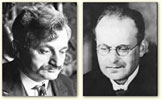Dennis Monokroussos writes:
As mentioned on my blog a couple
of days ago, we’ll spend this week and probably next week, too, looking
at the fascinating game between Emanuel Lasker and Aron Nimzowitsch from Zurich
1934. The game caught my eye a few weeks ago when I went through it without
knowing who the players were or what the result would be. White (Lasker) made
what looked like an egregious error – because it was! – and I assumed
that punishment would be swift, sure, and brutal.

Emanuel Lasker, Aron Nimzowitsch
Instead, the game continued. White was worse – seriously and chronically
worse – but somehow Black couldn’t put his opponent away. The advantage
would take one form, then another, but White was able to maintain the material
balance and keep enough play in the position to cause problems. The longer the
game went, the more impressed I was by White’s play! Finally, the players
reached a knight ending in which Black had an outside passed pawn, but White’s
king was active and the material was greatly reduced – I was starting
to think White’s Herculean labors might result in a draw. Unfortunately,
his opponent played the ending brilliantly while he committed a nearly imperceptible
inaccuracy, and Black finally brought home the point.
Although the typical presentation of a defensive masterpiece will result in
a happy ending, life doesn’t always work that way. Sometimes one’s
best isn’t quite good enough. Even so, this game, and especially Lasker’s
defensive play (and Nimzowitsch’s technique in the knight ending), is
worthy of our attention. Lasker was a genius when it came to fighting his way
out of difficulties, and there is much we can learn from his efforts here. There
are also useful lessons about the endgame and about how NOT to play against
the French. And all you’ll need to do is show up this Thursday night at
9 pm ET with an attentive mind!
Dennis Monokroussos'
Radio ChessBase
lectures begin on Thursdays at 9 p.m. EDT, which translates to 02:00h
GMT, 03:00 Paris/Berlin, 13:00h Sydney (on Tuesday). Other time zones
can be found at the bottom of this page. You can use Fritz or any Fritz-compatible
program (Shredder, Junior, Tiger, Hiarcs) to follow the lectures, or download
a free trial client. |
You can find the exact times for different locations in the world at World
Time and Date. Exact times for most larger cities are here.
And you can watch older lectures by Dennis Monokroussos offline in
the Chess Media System room of Playchess:
Enter the above archive room and click on "Games" to see the lectures.
The lectures, which can go for an hour or more, will cost you between one and
two ducats.
That is the equivalent of 10-20 Euro cents (14-28 US cents).
 Dennis
Monokroussos is 40, lives in South Bend, IN, and is an adjunct professor
of philosophy at the University of Notre Dame.
Dennis
Monokroussos is 40, lives in South Bend, IN, and is an adjunct professor
of philosophy at the University of Notre Dame.
He is fairly inactive as a player right now, spending most of his non-philosophy
time being a husband and teaching chess. At one time he was one of the strongest
juniors in the U.S., but quit for about eight years starting in his early 20s.
His highest rating was 2434 USCF, but he has now fallen to the low-mid 2300s
– "too much blitz, too little tournament chess", he says.
Dennis has been working as a chess teacher for seven years now, giving lessons
to adults and kids both in person and on the internet, worked for a number
of years for New York’s Chess In The Schools program, where he was
one of the coaches of the 1997-8 US K-8 championship team from the Bronx, and
was very active in working with many of CITS’s most talented juniors.
When Dennis Monokroussos presents a game, there are usually two main areas
of focus: the opening-to-middlegame transition and the key moments of the middlegame
(or endgame, when applicable). With respect to the latter, he attempts to present
some serious analysis culled from his best sources (both text and database),
which he has checked with his own efforts and then double-checked with his
chess software.




















 Dennis
Monokroussos is 40, lives in South Bend, IN, and is an adjunct professor
of philosophy at the University of Notre Dame.
Dennis
Monokroussos is 40, lives in South Bend, IN, and is an adjunct professor
of philosophy at the University of Notre Dame.




